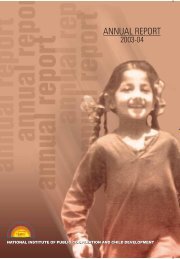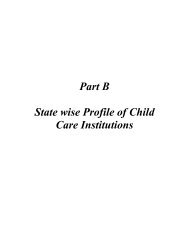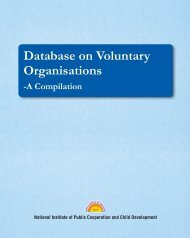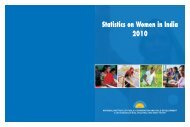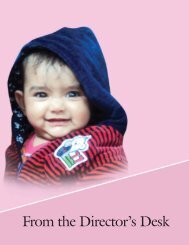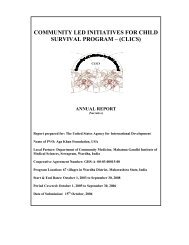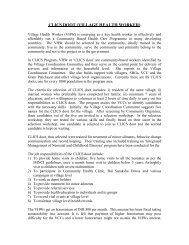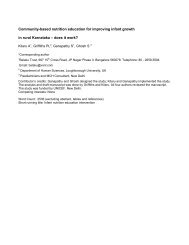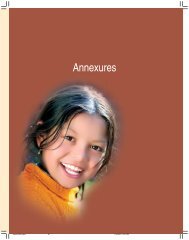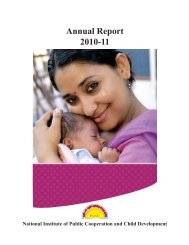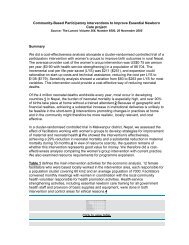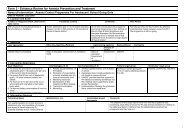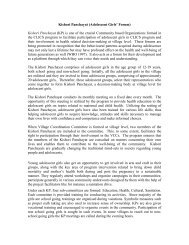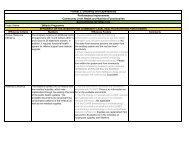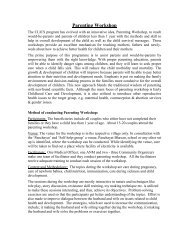Create successful ePaper yourself
Turn your PDF publications into a flip-book with our unique Google optimized e-Paper software.
CONTENTS<br />
Editorial 2<br />
Budget Position 3<br />
Maternal Mortality 4<br />
Events: <strong>July</strong> 7<br />
Events: August 10<br />
Events: <strong>Sep</strong>tember 13<br />
UNICEF Cooperation 17<br />
Training Programmes 18<br />
We would like to have your<br />
feedback on MWCD Newsletter<br />
Sampark. We request the readers<br />
to send their opinions, not only on<br />
its contents and overall looks, but<br />
also on the additional inputs they<br />
consider would make this<br />
publication more useful. These<br />
letters shall be published under the<br />
column, Letters to the Editor. We<br />
look forward to letters from you.<br />
FROM THE EDITOR’S DESK<br />
IBSA Women’s Forum-Forging Transnational Alliances<br />
While multifarious programmes specifically target development of women, the<br />
experience of other countries with similar socio-economic background, certainly<br />
adds in identifying the gaps and in formulation of effective strategies towards<br />
women empowerment. In this backdrop, the recent meeting (13-14 October,<br />
2008) of senior leaders and officials of India, Brazil and South Africa (IBSA)<br />
held in Vigyan Bhawan, New Delhi is a step in the right direction. The theme of<br />
the meeting was Strengthening the Women’s Movement for an Equitable Society,<br />
The meeting was a follow-up to the launch of the Women’s Forum in the 2 nd<br />
Summit held in Cape Town (South Africa) on 17 th October, 2007. The launch<br />
was conducted by the Prime Minister of India, President of Brazil and the<br />
President of South Africa.<br />
Addressing the participants at the IBSA Women’s Forum in New Delhi, Smt.<br />
Renuka Chowdhury, Hon’ble Minister of State for Women & Child Development<br />
(Independent Charge) stated that the entry of women into mainstream economy<br />
and other critical institutional areas is to be pursued vigorously and much can<br />
be achieved by sharing and learning from the best practices available within<br />
IBSA countries. The proposed collaboration with Brazil and South Africa is<br />
thus at both, policy and programmatic levels. The areas of cooperation envisioned<br />
in the memorandum of understanding signed by the three countries during the<br />
3 rd Summit on 15 th October, 2008 includes discussions and deliberations on<br />
inclusive macroeconomic policy and research, gender budgeting, women and<br />
microfinance, skills development and capacity building, violence against women,<br />
civil society partnerships and trilateral projects. We believe, the collaborative<br />
venture will accelerate the pace of empowerment of women in our country, thus<br />
contributing to overall national development.<br />
Yet another landmark event in the Ministry of Women and Child Development,<br />
is the publishing of the monthly magazine, Anganvarta. Targeted primarily at<br />
Anganwadi workers, the upcoming monthly issue will inform and educate the<br />
readers about the latest and best practices in the overall development of children<br />
and women in Hindi, English and 11 other regional languages. Anganvarta will<br />
fulfill a long-felt need, by endeavouring to establish a positive mindset about<br />
rearing and grooming of our young ones in a happy and healthy way.<br />
Chief Editor<br />
Members<br />
Editorial Board<br />
Dr. Kiran Chadha, Joint Secretary, MWCD<br />
[Dr. (Mrs.)Kiran Chadha]<br />
Chief Editor<br />
MWCD Newsletter Sampark<br />
2<br />
Dr. A.K. Gopal, Director, NIPCCD<br />
Dr. Dinesh Paul, Additional Director, NIPCCD<br />
Shri H.K. Barthwal, Editor, NIPCCD<br />
Volume 5 Issue 1
BUDGET POSITION<br />
The Ministry of Women and Child Development has been working towards effective budgetary control throughout<br />
the preceding months. The budgetary position as on 30th of <strong>Sep</strong>tember 2008 under Plan and Non-Plan Heads has<br />
been as under.<br />
Plan and Non-Plan Expenditure up to 30.06.08<br />
Figures are in Rs. crores<br />
Year Plan/ Budget Progressive Percentage of<br />
Non-Plan Estimate Allocation up to 4/3<br />
2008-09 30 June 2008<br />
1 2 3 4 5<br />
2008-09 Plan 7200.00 2901.06 40.13<br />
Non-Plan 62.00 26.07 42.05<br />
CENTRAL ADOPTION RESOURCE AUTHORITY<br />
Central Adoption Resource<br />
Authority (CARA), an autonomous<br />
body under the Ministry of Women<br />
and Child Development is involved<br />
in promotion of domestic adoption.<br />
It regulates inter-country adoption<br />
for placement of Indian children.<br />
More than 50 children from Delhibased<br />
adoption agencies gathered<br />
at the residence of Smt. Renuka<br />
Chowdhury Hon’ble Minister of<br />
State (IC), M/o WCD to welcome her on her 54 th bithday. The children welcomed the Hon’ble Minister with bunches<br />
of flowers. Hon’ble Minister conveyed her blessings to all the children and distributed sweets on the occasion.<br />
Profile of Minister of State (IC), Smt. Renuka Chowdhury<br />
Smt. Renuka Chowdhury, a prominent Indian<br />
politician and the Minister of State for Women and Child<br />
Development in the Government of India since mid-<br />
2004 is a Post-Graduate in Industrial Psychology. She<br />
entered politics in 1984 and was with the Telugu Desam<br />
Party till 1998. Smt. Chowdhury has been a member of<br />
the Rajya Sabha for two consecutive terms, from 1986<br />
to 1992 to 1998. During that period, she was the Chief<br />
Whip, Telugu Desam Parliamentary Party. In 1999 and<br />
2004, she was elected to the 13 th and 14 th Lok Sabha<br />
respectively representing Khammam. She was also the<br />
Union Minister of State for Health and Family Welfare<br />
(1997-98) in the cabinet of H.D.<br />
Deve Gowda. Other important<br />
positions held by her include<br />
memberships of the Committee on<br />
Finance (1999-2000) and Committee<br />
on the Empowerment of Women<br />
(2000-2001). Smt. Renuka<br />
Chowdhury was later elected as<br />
Minister for Tourism, during the<br />
tenure of Manmohan Singh. She was responsible for<br />
the 2006 passing of the Domestic Violence Bill which<br />
was signed into law on 13 th <strong>Sep</strong>tember, 2005.<br />
MWCD Newsletter Sampark Volume 5 Issue 1<br />
3
Maternal Mortality<br />
A Senseless Tragedy<br />
Surviving childbirth is a fundamental right of every<br />
woman. Yet, in India, one woman dies every five minutes<br />
from a pregnancy related cause. It is estimated that for<br />
every 100,000 live births in India, 407 mothers will die,<br />
60 to 70 times more than in developed countries. An<br />
irony indeed that one life should be lost in the process<br />
of creating another.<br />
It is further estimated that for each woman who dies, as<br />
many as 30 other women develop chronic, debilitating<br />
conditions which seriously affect their quality of life.<br />
Despite overall development in the country, there is no<br />
sign of reduction in maternal deaths in the last 10 years.<br />
The situation is worse in rural areas where the maternal<br />
mortality ratio is very alarming. In Uttar Pradesh, the<br />
Maternal and Child Survival<br />
Not just a health issue, but also a human rights one<br />
Maternal deaths per<br />
100 000 live births<br />
1000<br />
not available<br />
Maternal mortality ratio, by country, 2005<br />
rate is even more alarming at 707 (SRS,1998), exceeded<br />
only by Orissa at 739, NFHS 2. By comparison, MMR<br />
is 6.1 in Japan, 8.3 in the US and 5.4 in Germany.<br />
With over one lakh women in India dying of pregnancyrelated<br />
causes every year, an estimated 350,000 children<br />
are orphaned. A total of 90,000 families are devastated<br />
as a result of this tragedy. As for the motherless children,<br />
their plight can only be imagined. Such children are up<br />
to 10 times more likely to die within two years of birth<br />
than are those who have living parents.<br />
What compounds the tragedy is that almost all these<br />
deaths can be prevented, with timely and proper medical<br />
care. More than good quality health services, however,<br />
what is required is empowerment of women and<br />
guarantee of their human rights, i.e. right of life, liberty<br />
security. Every woman should have access to appropriate<br />
health care, and the right to survive childbirth.<br />
Source: Maternal mortality in 2005. Estimates developed by WHO, UNICEF, UNFPA and The<br />
World Bank. World Health Organization, 2007<br />
The survival and well-being of mothers and children is central to societal well-being and development. When women<br />
die while giving birth, it points to social injustice, for it reflects a societal milieu where women are powerless and<br />
have unequal access to basic health care, education, employment, finance and other resources. These harsh and<br />
unjust realities make a woman’s pregnancy fraught with problems. Making motherhood safer requires more than<br />
MWCD Newsletter Sampark Volume 5 Issue 1<br />
4
good quality health services. Empowering women is<br />
necessary so that they can stand and fight for their rights<br />
to good quality services and their right to information<br />
during and after pregnancy. Therefore, the parameters of<br />
the problem extend beyond health and become a human<br />
rights issue as well.<br />
Human rights principles exist in constitutions and in<br />
regional and international human rights treaties to which<br />
nations have voluntarily committed themselves. What is<br />
crucial is that these laws be translated into effective action.<br />
International human rights treaties and most national<br />
constitutions guarantee:<br />
The right to life, liberty and security<br />
This relates to access to appropriate health care and<br />
guarantees that citizens can choose when and how<br />
often to bear children.<br />
Rights that relate to the foundation of families and<br />
of family life<br />
Healthcare plays a big part in the right to establish<br />
families and enjoy life within them.<br />
The right to health services (including information<br />
and education) and the benefits of scientific<br />
progress<br />
These not only make it imperative for governments<br />
to provide reproductive and sexual healthcare to<br />
women but also information that impacts health<br />
issues.<br />
The right to equality and non-discrimination<br />
Gender should not be an excluding factor. All women<br />
and girls must have access to services (such as<br />
education and healthcare) regardless of age, marital<br />
status, ethnicity or socio-economic status.<br />
International treaties that advance safe motherhood:<br />
Convention on the Elimination of All Forms of<br />
Discrimination Against Women (Women’s Convention),<br />
International Covenant on Civil and Political Rights,<br />
International Covenant on Economic, Social and Cultural<br />
Rights, Convention on the Rights of the Child, European<br />
Convention on Human Rights, American Convention on<br />
Human Rights, African Charter on Human and Peoples’<br />
Rights.<br />
Causes of Maternal Death<br />
Severe bleeding<br />
(hemorrhage) 25%<br />
Infections 15%<br />
Eclampsia 12%<br />
Obstructed labour 8%<br />
Unsafe abortion 13%<br />
Other direct causes 8%<br />
Indirect causes 20%<br />
Source: The World Health Report 2005. Make every mother and child<br />
count. Geneva World Health Organization, 2005.<br />
Government of India’s Maternal Health<br />
Programme<br />
One of the major goals of the Department of Family<br />
Welfare, Government of India, is to reduce maternal<br />
mortality and morbidity. Several new initiatives under<br />
Reproductive and Child Health (RCH) programme have<br />
been taken in this regard.<br />
Training of MBBS doctors in anaesthetic skills for<br />
EMOC at FRU<br />
To alleviate shortage of specialist manpower, the<br />
Government of India has launched a training programme<br />
in anaesthetic skills for Emergency Obstetric Care for<br />
qualified doctors at FRUs. The 18-week programme for<br />
the first batch has been pilot tested at the All India Institute<br />
of Medical Sciences (AIIMS), Delhi and is being<br />
disseminated to the states.<br />
Establishing blood storage centres at FRUs<br />
Timely treatment for complications associated with<br />
pregnancy can often not be given because of nonavailability<br />
of blood transfusion services at FRUs. To help<br />
alleviate this problem, the Drugs and Cosmetics Act has<br />
been amended and guidelines for Blood Storage Centres<br />
(BSCs) have been prepared and disseminated to the states.<br />
Development of Guidelines for Antenatal Care and<br />
Skilled Attendance at birth by ANMs and LHVs.<br />
The government has recently issued guidelines for ANMs/<br />
LHVs/Staff Nurses to use certain drugs for specific<br />
situation in emergency obstetric care. The guideline also<br />
outlines how ANMs/LHVs can perform simple<br />
procedures like active management of the third stage of<br />
labour, use of partograph for diagnosis etc., before<br />
referral. These guidelines have been developed to assist<br />
health personnel to effectively provide the requisite advice<br />
both quantitatively and qualitatively.<br />
MWCD Newsletter Sampark Volume 5 Issue 1<br />
5
Development of Guidelines for Operationalising a<br />
Primary Health Centre (PHC) to provide 24-hour<br />
delivery and newborn care under RCH<br />
The Guidelines assist States to plan for and operationalise<br />
at least 50 per cent of the PHCs as 24- hour functional<br />
units in a phased manner. These PHCs will be responsible<br />
for providing round the clock delivery services including<br />
the management of common obstetric complications,<br />
emergency care of sick children and referrals.<br />
Guidelines for Pregnancy Care and Management of<br />
Common Obstetric Complication by Medical Officers<br />
The Government of India envisages that by 2010, 50 per<br />
cent of PHCs and all Community Health Centres should<br />
be operationalised as 24-hour delivery centres. These<br />
centres will also be responsible for providing pre-referral<br />
emergency care for women. GOI has, therefore,<br />
developed these guidelines for medical officers to help<br />
them provide services to women in labour and in obstetric<br />
emergencies and, thereby, reduce maternal mortality.<br />
Janani Suraksha Yojna (JSY)<br />
Under the overall umbrella of National Rural Health<br />
Mission (NRHM), Janani Suraksha Yojana has been<br />
introduced with the vision of reducing MMR and IMR<br />
and increasing institutional deliveries in families below<br />
the poverty line (BPL). JSY integrates the cash assistance<br />
with antenatal care during the pregnancy period,<br />
institutional care during delivery and immediate postpartum<br />
period in a health centre by establishing a system<br />
of coordinated care by field level health worker. The main<br />
strategy is to achieve the envisaged vision by linking the<br />
cash assistance under JSY to institutional delivery. This<br />
centrally sponsored scheme provides 100 per cent central<br />
assistance to states /UTs for extending financial help @Rs<br />
500 per pregnancy for first two live births to the women<br />
belonging to BPL families.<br />
Under the National Rural Health Minister (NRHM) every<br />
village/large habitat will have a female Accredited Social<br />
Health Activist (ASHA) chosen by and accountable to<br />
the Panchayat to act as the interface between the<br />
community and the public healthcare system. ASHA will<br />
act as a link between the beneficiary at the village level,<br />
the Anganwadi worker and ANM. She will help and guide<br />
women to access the health facilities for antenatal care,<br />
institutional delivery, post-natal care and counselling on<br />
nutrition and family planning services.<br />
Vande Mataram Scheme<br />
The scheme is under the Public Private Partnership<br />
initiative, with the involvement of the Federation of<br />
Obstetric and Gynecological Society of India and private<br />
clinics. The aim is to reduce the maternal mortality and<br />
morbidity of pregnant mothers by involving and utilising<br />
the vast resources of specialists/trained workforce in the<br />
private sector. The scheme intends to provide free<br />
antenatal and post-natal check-up, counselling on<br />
nutrition, breastfeeding, spacing of birth, etc. This is a<br />
voluntary scheme wherein any OBG specialist, lady<br />
doctor/MBBS doctor, maternity home, nursing home can<br />
volunteer their services.<br />
In addition to the Central government programmes,<br />
several states have their own state-specific schemes aimed<br />
at safe motherhood. In Kerala, for instance, the Mahila<br />
Swasthya Sangh scheme was designed to motivate women<br />
to adopt measures to ensure maternal well-being.<br />
MWCD Newsletter Sampark Volume 5 Issue 1<br />
6
THE EVENTS : JULY 2008<br />
Meeting of National Nutrition<br />
Mission<br />
The third meeting of the Executive Committee of the<br />
National Nutrition Mission was held on 8 <strong>July</strong> 2008<br />
in Vigyan Bhawan, New Delhi under the<br />
Chairpersonship of Smt. Renuka Chowdhury, Hon’ble<br />
Minister of State (IC) for Women and Child<br />
Development.<br />
Various issues related to malnutrition, fortification of<br />
food with micronutrients and expansion of the Food<br />
and Nutrition Board (FNB) upto District level were<br />
discussed. Guidelines were issued to the Regional<br />
Deputy Technical Advisers and field units for the<br />
celebration of World Breastfeeding Week from 1-7<br />
August 2008.<br />
The field infrastructure of FNB comprising 43 field<br />
units located in 29 States and UTs of the country<br />
organised training courses in Home Scale Preservation<br />
of Fruits and Vegetables and Nutrition for adolescent<br />
girls and housewives. It conducted Nutrition Education<br />
programmes in rural, urban and tribal areas and<br />
monitored ICDS Anganwadis in respect of<br />
Supplementary Feeding and Nutrition & Health<br />
Education component. The units also organised training<br />
courses in Nutrition Education for Master Trainers, i.e.<br />
Training of Trainers (TOTs) for Child Development<br />
Project Officers, ACDPOs, Medical Officers, etc.<br />
PPP Meet on Trafficking<br />
The first meeting of the Think-Tank on Public Private<br />
Partnership to Prevent and Combat Trafficking of Women<br />
and Children was held under the Chairmanship of the<br />
Secretary, WCD on 23 <strong>July</strong> 2008.<br />
The Economic Adviser, Ministry of Women and Child<br />
Development inaugurated a workshop on “Migration and<br />
Trafficking” organised by Gramin Niyojan Kendra.<br />
Ghaziabad up on 28 <strong>July</strong> 2008.<br />
Monitoring under PC & PNDT Act to<br />
Curb Foeticide<br />
The members of the National Inspection & Monitoring<br />
Committee (NIMC) under PC & PNDT Act, including<br />
members from the Ministry of Women and Child<br />
Development (MWCD) inspected 13 USG clinics/<br />
diagnostic centres/ nursing homes in Uttar Pradesh: 4 in<br />
Lucknow district, 5 in Sitapur and 4 in Barabanki during<br />
9-11 <strong>July</strong> 2008 and advised seizing the records and<br />
sealing these clinics /diagnostic centres /nursing homes<br />
as they were not following the norms set under PC &<br />
PNDT Act.<br />
The Committee Members also inspected 8 USG clinics/<br />
diagnostic centres in Dehradun district of Uttarakhand<br />
during 23-25 <strong>July</strong> 2008 and advised to seizing the records<br />
and sealing 7 clinics/ diagnostic centres/ nursing homes<br />
as they were not observing the provisions or the relevant<br />
Act, while show cause notice was served to one clinic.<br />
MWCD Newsletter Sampark Volume 5 Issue 1<br />
7
Meeting on Dhanalakshmi Scheme<br />
A meeting to discuss the implementation of Dhanalakshmi<br />
- Conditional Cash Transfer for Girl Child with Insurance<br />
Cover was held on 16 <strong>July</strong> 2008 under the Chairmanship<br />
of Secretary, Ministry of Women and Child Development<br />
(MWCD). Representatives from the state governments<br />
also participated in the meeting.<br />
Launch of Centenary Celebrations<br />
At a press conference held at India International Centre<br />
on 17 <strong>July</strong> 2008, Smt. Prema Cariappa, Chairperson<br />
Central Social Welfare Board formally announced the<br />
launch of Dr. Durgabai Deshmukh Birth Centenary Year<br />
celebrations and the new name of the Central Board’s<br />
office building in New Delhi, which will now be known<br />
as Dr. Durgabai Deshmukh Samaj Kalyan Bhawan.<br />
Henceforth, the ‘home’ of the board will bear the name<br />
of its founder chairperson in honour of her revered<br />
memory.<br />
The Central Social Welfare Board is launching a yearlong<br />
celebration for the birth centenary of Dr. Durgabai<br />
Deshmukh throughout the country, in partnership with<br />
the State Social Welfare Boards in all 22 States.<br />
Gender Equality<br />
MWCD constituted a Task Force on the<br />
recommendation of the Committee of Secretaries for<br />
Preparation of an Action Plan for Convergence and<br />
Coordination of Government Programmes for “Gender<br />
Equality and fighting Social Evils”. The first meeting<br />
of the Task Force was held on 31 <strong>July</strong> 2008 under the<br />
Chairmanship of Secretary, MWCD.<br />
Campaign to Save Girl Child<br />
Bangalore: As the sex ratio in the state has been<br />
dwindling over the decades, ‘Save the Girl Child’<br />
campaign was launched by the Department of Health<br />
and Family Welfare on Save the Girl Child Day observed<br />
on 1 <strong>July</strong>. A rally organised by the Department to kick<br />
start the year long campaign was inaugurated by Health<br />
Minister, Shri. B Sriramulu.<br />
A rally which was the initiation to the campaign saw<br />
600 participants from nursing schools and Pre<br />
University Colleges. The sex ratio statistics are dismal<br />
with Karnataka recording a girls to boys ratio of 960 :<br />
1000 in 1991 which has fallen to 946:1000. The year<br />
long campaign will include creating awareness through<br />
different media, holding a judicial colloquium in<br />
Bangalore and District Headquarters to create greater<br />
awareness for judges on the legal aspects and holding<br />
debates in schools and colleges.<br />
- The Deccan Herald,<br />
2 <strong>July</strong> 2008<br />
Education: From Today, A is for Apple<br />
for all Class I students in UP<br />
Over 86 lakh primary school students in UP will begin to<br />
learn a new language-English. They will first learn the<br />
meaning of star, sky, diamonds and then the rhyme,<br />
Twinkle, Twinkle Little Star.<br />
Since English is taught from Class III now, Class II<br />
students, too, will get their first lessons in the language<br />
this year. There are around 46 lakh students in Class I<br />
and about 40 lakh in Class II.<br />
Text books are ready and being sent to district<br />
headquarters while the District Institutes of Education<br />
and Training are busy preparing for orientation classes<br />
of teachers. The books, prepared by the State Council for<br />
Educational Research and Training, introduces the<br />
language with the help of colourful pictures, illustrations,<br />
cartoons and rhymes. The books will be distributed free<br />
to students.<br />
The decision to introduce English from Class I was taken<br />
earlier this year after an official study found that students<br />
‘feared’ the language when they first studied it in Class<br />
III, and the fear continued, making them hesitant and<br />
lacking in confidence. “The first expectation is that<br />
MWCD Newsletter Sampark Volume 5 Issue 1<br />
8
students of.... our parishadiya schools should be able to<br />
compete with students of private schools as in majority<br />
of cases, the lack of knowledge of English becomes a<br />
hindrance. Moreover, for introducing them to computers<br />
or technologies, English plays an important role” said R<br />
P Singh, Secretary, Basic Education. The introductory<br />
remark on the books spells out that hope, “English<br />
language will enhance the quality of life of our children<br />
and widen their thinking.”<br />
New teachers have not been recruited. “All our teachers<br />
are qualified and experienced. A bit of orientation and<br />
they will handle it well,” said D C Kanaujia, Director of<br />
Basic Education.<br />
Factsheet<br />
-The Indian Express ,<br />
1 <strong>July</strong> 2008<br />
• An estimated 15% of all pregnant women develop<br />
life-threatening complications<br />
• Globally, for every 2 people who die in traffic<br />
accidents, one mother and 20 children die from<br />
preventable and treatable causes (WHO, 2004).<br />
• Every minute, 20 children < 5 yrs die, nearly 30,000<br />
children die every day, 10.6 million children die<br />
each year (Black, Morris & Bryce, 2003). Of these<br />
3.1 million are from SE Asia.<br />
• Up to a third of maternal mortality and morbidity<br />
could be avoided if women had access to<br />
information and modern, safe and effective fertility<br />
control methods<br />
• For every 3 deaths of women in their reproductive<br />
years in developing countries, one is the result of<br />
complications from pregnancy and childbirth. In<br />
India, 15% of deaths of women in the reproductive<br />
age are maternal deaths.<br />
• Worldwide unsafe abortions contribute to nearly<br />
15% of all maternal deaths In India, nearly 7 million<br />
abortions take place annually. Post abortion care is<br />
essential to safe motherhood. (Information Kit,<br />
World Health Day ’98, WHO)<br />
• Globally, just 61% of births are assisted by a skilled<br />
attendant, while in some low income countries the<br />
average is as low as 34% (WHO,2004)<br />
• HIV/AIDS presents an ever-increasing threat to<br />
both mothers and their children. Women account<br />
for nearly half of all adults living with HIV/AIDS<br />
(UNAIDS, 2004). This increases the risk of motherto-child<br />
transmission of HIV.<br />
Manipur NGO forms Child Protection<br />
Force<br />
Newmai News Network IMPHAL, <strong>July</strong> 29-Amidst<br />
rampant kidnapping of children in Manipur valley<br />
currently the all Manipur NGO forum has created a<br />
Special Child Protection Alliance Force in co-ordination<br />
with the security force agencies, legal authorities, and<br />
voluntary organisations, said a spokesperson of the NGO<br />
Forum on Monday at a press meet here. The force will<br />
take up awareness programmes specially in the valley<br />
areas of Bishnupur, Imphal West, Imphal East and<br />
Thoubal districts. Speaking to the media, Chinfglen, a<br />
member of the Forum revealed that the Forum will very<br />
soon send a request petition to the Ministry of Home<br />
Affairs and to the Chief Minister to keep a special package<br />
for the protection of children from trafficking. He<br />
lamented the unfortunate gap between the security forces<br />
and the public. He therefore urged for unity between the<br />
two sides in fighting against the kidnapping of children<br />
in the State. He further insisted that the public play a<br />
more serious role in fighting against the kidnapping of<br />
children.<br />
He also appealed to the militants to release the children<br />
if any were in their custody and not to recruit children<br />
below the age of 18 years into their outfit. He also said<br />
that so far no one has stopped an adult from taking his<br />
own decisions.<br />
Dr. K. Pounchunbow, President of the Forum, said child<br />
trafficking and kidnapping was against international law<br />
and hence, illegal. So many years have passed and this is<br />
the first time in the history of Manipur that child<br />
kidnapping and trafficking has become a burning issue,<br />
he added.<br />
Mr. Sarat, advisor of the Forum, revealed that the present<br />
issue of child kidnapping could have a psychological<br />
effect on the child and hence a public opinion was needed<br />
in this case.<br />
- The Assam Tribune,<br />
1 Aug 2008<br />
RASHTRIYA MAHILA KOSH<br />
During the month of <strong>July</strong> 2008 (from 25.06.2008 to<br />
24.07.2008), Rashtriya Mahila Kosh (RMK) disbursed a<br />
loan aggregating to Rs. 50.00 lakh to one NGO partner<br />
in Tamil Nadu.<br />
MWCD Newsletter Sampark Volume 5 Issue 1<br />
9
THE EVENTS : AUGUST 2008<br />
CSWB Celebrates Foundation Day<br />
The Central Social Welfare board celebrated its 55 th<br />
Foundation Day on 12 August 2008 in the office of the<br />
Board. The function was presided over by Smt. Prema<br />
Cariappa, Chairperson, Central Social Welfare Board.<br />
Smt. Motia Garg, Chairperson, Delhi State Social Welfare<br />
Board was also present on this occasion.<br />
Smt. Cariappa inaugurated the programme by formally<br />
lighting a lamp, after which she paid homage to Founder<br />
Chairperson Dr. Durgabai Deshmukh. The famous<br />
patriotic song ‘Sare Jahan se Accha’ was rendered by<br />
Prevention of Trafficking<br />
the Central Board staff choir led by Smt. Minoti<br />
Bhattacharya.<br />
Smt. Prema Cariappa, in her presidential address said, “I<br />
feel honoured to be standing in place of Dr. Durgabai<br />
Deshmukh who was our Founder Chairperson and to be<br />
carrying on the glorious traditions of the Board. In this<br />
long journey of 55 years, the Board has made great strides<br />
in the implementation of programmes for mainstreaming<br />
women and children so that they can participate in the<br />
progress of the nation.”<br />
After the presidential address, a cultural programme,<br />
beginning with Dr. Z.A. Zaidi reading out his poem on<br />
the condition of elderly persons in society, was presented<br />
by officers and staff of CSWB. This was followed by a<br />
humorous poem by Smt. Shashi Kapoor and a Bangla<br />
folk song by Smt. Minoti Bhattacharya. The theme of<br />
the song was the impermanence of the world and our<br />
attachment with it. In conclusion, Smt. Minoti<br />
Bhattacharya and the CSWB choir presented ‘Hum Honge<br />
Kamyaab’ (‘We shall overcome’) and the entire audience<br />
joined the chorus. Smt. Neelam Bhardwaj, Joint Director<br />
and the convenor of the cultural programme, gave a vote<br />
of thanks.<br />
The Ministry of Women and Child Development, in collaboration with the National Institute of Public Cooperation<br />
and Child Development organised a workshop on Public Private Partnership in Bangalore, Karnataka on 8 August<br />
2008.<br />
The Meeting of the Central Advisory Committee to combat trafficking was held on 13 August 2008 under the<br />
Chairpersonship of Secretary, WCD where representatives of line-Ministries, non-government organisations and<br />
other experts participated.<br />
The representative of the Ministry participated in the Regional preparation for the World Congress III against<br />
Sexual Exploitation of Children and Adolescents in Kathmandu from 27-29 August 2008.<br />
MWCD Newsletter Sampark Volume 5 Issue 1<br />
10
Selection of Rajiv Gandhi Manav<br />
Seva Awardees<br />
The meeting of the National Selection Committee for<br />
selection of the Rajiv Gandhi Manav Seva Award for<br />
Service to Children, 2007 was held on 20 August 2008<br />
under the Chairpersonship of MOS(IC) WCD. The<br />
following three individuals have been selected:<br />
1. Shri Maheshbhai S. Kothari, Manav Kalyan Trust,<br />
CL Parikh Mamta Mandir Dandi Road, Vijalpore,<br />
Navasari, Gujarat.<br />
2. Dr. Azariah Korabandi, 5-3-224, Mission Hospital<br />
Road, Khammam (AP).<br />
3. Ms. Meena K. Jain, 1364, IInd Floor, 4th Cross, I<br />
Stage, II Phase, Chandra Layout, Bangalore<br />
(Karnataka).<br />
TNAI Organises Workshop on Midwifery<br />
Practices and Safe Motherhood<br />
In the wake of the alarming rise in complications and<br />
deaths due to pregnancy-related causes, the Trained<br />
Nurses Association of India (TNAI) organised a workshop<br />
on midwifery and safe motherhood in New Delhi during<br />
25-30 August 2008. The workshop was held by TNAI in<br />
collaboration with Indian Institute of Management (IIM),<br />
Ahmedabad as a part of Swedish International<br />
Development Agency (SIDA) project.<br />
The workshop, which drew nursing officers, midwifery<br />
teachers and senior nurse administrators working in<br />
northern states, was inaugurated by Dr. Prakin Suchaxaya,<br />
Ag Regional Adviser (Nursing) in World Health<br />
Organisation with Mrs. Yasmin Zaveri Rou, Programme<br />
Officer in the Embassy of Sweden as guest of honour.<br />
The presidential address was delivered by Shri A.B.<br />
Kulkarni, President, TNAI.<br />
TNAI, the national apex body to promote nursing and<br />
health care interests at non-government level networks<br />
with government and like-minded institutions. It organises<br />
programmes, workshops and conferences for nursing<br />
professionals to build a healthier and happier nation.<br />
Vatsalya Mela in Kerala<br />
With a view to provide marketing opportunities to rural<br />
and urban women entrepreneurs of self-help groups,<br />
Kerala State Social Welfare Board organised Vatsalaya<br />
Mela at VJT Hall in Thiruvanathapuram during 25 -28<br />
August 2008.<br />
The Mela, organised on the eve of the popular Onam<br />
festival was inaugurated by Smt. P.K. Sreemathi Teacher,<br />
Hon’ble Minister for Health and Social Welfare. She<br />
emphasised the need for convergence of services of<br />
various departments working for women. Earlier, Smt.<br />
Girija Surendran, Ex. MLA & Chairperson, Kerala State<br />
Social Welfare Board mentioned that free legal<br />
counselling service for women in distress through Service<br />
Providing Centres like FCC, Short-Stay Home, Women<br />
Help Line Centres, Shelter Homes and Mahila Mandirams<br />
of Welfare Department were available.<br />
The inaugural function which drew more than 50<br />
institutions, was presided over by Smt. Prema Cariappa,<br />
Chairperson, CSWB.<br />
UNESCO Concern at Pregnancyrelated<br />
Deaths<br />
UNESCO estimates that over a lakh woman in India<br />
die of pregnancy-related causes every year, and as a<br />
result, about three and half lakh children are orphaned.<br />
Further, such child orphans are up to 10 times more<br />
vulnerable to death within a couple of years than normal<br />
children with their parents. The world body deplores<br />
that despite overall development, there is no sign of<br />
reduction in maternal deaths in the last 10 years.<br />
MWCD Newsletter Sampark Volume 5 Issue 1<br />
11
Gender Budgeting<br />
Ministry of Women and Child Development (MWCD)<br />
in collaboration with Indian Institute of Public<br />
Administration (IIPA) conducted a Gender Budgeting<br />
workshop on 7-8 August 2008 for representatives of<br />
Ministries and Departments.<br />
The Ministry in collaboration with National Institute of<br />
Women and Child Development organised a Gender<br />
Budgeting workshop for North Eastern States in<br />
Guwahati on 21-22 August 2008 for State Governments<br />
and representatives of non-government organisations.<br />
MWCD representatives gave orientation on Gender<br />
Budgeting in the workshop organised by the ISTM for<br />
middle-level Government Officers on 25 August 2008.<br />
The Ministry conducted a workshop on Gender<br />
Budgeting for the officers of various Ministries and<br />
Departments of the Government of Uttar Pradesh on 28-<br />
29 August 2008.<br />
GOI-UNICEF Country Plan of Action<br />
The Hon’ble Minister of State (Independent Charge),<br />
Ministry of Women and Child Development, Smt. Renuka<br />
Chowdhury, launched the Country Plan of Action 2008-<br />
12 of GOI-UNICEF on 21 August 2008. The Resident<br />
Coordinator for UN, Dr. Maxine Olsen, and Country<br />
Representative of UNICEF, Ms. Karen Hulshof<br />
participated along with the representatives of State<br />
Governments, line Ministries, non-government<br />
organisations and other experts.<br />
RASHTRIYA MAHILA KOSH<br />
During the month of August 2008 (from 26.07.2008 to<br />
25.08.2008), Rashtriya Mahila Kosh disbursed loans<br />
aggregating Rs. 125.38 lakh to 7 NGO partners.<br />
A training programme for capacity building of NGOs<br />
was organised at National Institute of Public<br />
Cooperation & Child Development (NIPCCD),<br />
Bangalore from 28 <strong>July</strong> 2008 to 1 August 2008.<br />
Inspection of Erring USG Clinics<br />
A representative of MWCD, as a member of National<br />
Inspection & Monitoring Committee (NIMC) of PC<br />
PNDT inspected 5 USG clinics /diagnostic centres<br />
/nursing homes in the West District of Delhi on 23 August<br />
2008 along with the NIMC Team. The Team advised<br />
sealing of all the 5 clinics /diagnostic centres/ nursing<br />
homes as they were not following the norms set under<br />
PC & PNDT Act.<br />
A representative of MWCD as a member of National<br />
Inspection & Monitoring Committee (NIMC) of PC &<br />
PNDT inspected 20 USG clinics /diagnostic centres<br />
/nursing homes in Mumbai from 26-29 August 2008<br />
along with the NIMC Team. The Team advised sealing<br />
of all 19 clinics /diagnostic centres /nursing homes as<br />
they were not following the norms set under PC & PNDT<br />
Act while one diagnostic centre was issued show cause<br />
notice. The Team also visited Pune district of Maharashtra<br />
on 30 August 2008 and advised sealing of all the 5 clinics<br />
/diagnostic centres /nursing homes /hospitals inspected<br />
by the team.<br />
Independence Day Celebration<br />
Every year the Child Care Centre of NIPCCD celebrates<br />
Independence Day. Children and their mothers<br />
participated in a flag hoisting function organised in the<br />
Institute’s New Delhi premises on 15 August 2008.<br />
MWCD Newsletter Sampark Volume 5 Issue 1<br />
12
THE EVENTS : SEPTEMBER 2008<br />
NATIONAL INSTITUTE OF PUBLIC COOPERATION & CHILD DEVELOPMENT<br />
Hindi Day Celebration in NIPCCD<br />
National Institute of Public Cooperation and Child<br />
Development (NIPCCD) organised a Hindi fortnight<br />
during 1-15 <strong>Sep</strong>tember 2008 in a befitting manner.<br />
In this duration, besides Hindi workshop, competition on<br />
knowledge of Hindi including an item of dictation were<br />
conducted for the staff and officers of the Institute.<br />
The main function of the two-week programme was held<br />
on the final day i.e. 15 <strong>Sep</strong>tember 2008. Dr. Devendra<br />
Kumar Choube, Associate Professor at Centre for Indian<br />
Studies, Jawaharlal Nehru University was the chief guest<br />
at this occasion. He expressed satisfaction at the<br />
progressive use of Hindi in the Institute.<br />
Outlining the progress in the use of Hindi Dr. Dinesh Paul, Director Incharge said that most of the members of the<br />
Institute are now capable of performing their routine official works in Hindi. He outlined the progressive use of<br />
Hindi in all the divisions/ units of the Institute.<br />
The Chief Guest said that the language links different individuals but it has a wider role in the social context. He<br />
advised using simple and direct language in routine official matters. The 10 winners of various competition were<br />
given cash prizes under various categories.<br />
CENTRAL SOCIAL WELFARE BOARD<br />
National Conference of State Board Chairpersons<br />
The National Conference of State Board Chairpersons was held at CSWB, New Delhi on 3 <strong>Sep</strong>tember 2008. The<br />
Conference was chaired by Smt. Prema Cariappa, Chairperson, CSWB and it was attended by Chairpersons of all<br />
the State Social Welfare Boards.<br />
The CSWB Chairperson appealed to the Chairpersons of State Boards to adopt a humanitarian approach and advised<br />
that the problems of social development should be dealt with in an open minded, flexible manner but within the<br />
framework of rules and regulations. She said that State Boards are not only the implementing arms of CSWB, but<br />
also its monitoring eyes. The State Boards should regularly organise training through training institutes for<br />
strengthening and capacity building of voluntary organisations. She said that Shri Rajiv Gandhi had given the<br />
women of India a great gift in the form of the 73rd Amendment, bringing nearly 10 lakh women into the political<br />
process of the country every five years through Panchayati Raj institutions at the grassroots.<br />
She also emphasised the need for revamping of schemes of AGP, FCC, etc. in accordance with the emerging needs<br />
of today’s society so that these programmes are more effective in the prevailing social scenario. She expressed the<br />
hope that the conference will bring some concrete solutions in order to further simplify the procedures for<br />
implementation of ongoing programmes, quality improvement in the programmes and identifying new areas of<br />
interventions.<br />
For better delivery of its services, the Conference came up with recommendations related to (i) Special drive for<br />
aided organisations under e-AWEDAN, (ii) Uniformity of advertisement issued for NGOs seeking grants, (iii) Core<br />
banking for release of funds, and (iv) Disaster intervention.<br />
MWCD Newsletter Sampark Volume 5 Issue 1<br />
13
Food and Nutrition Board<br />
National Nutrition Week has been celebrated since 1982<br />
so as to intensify nutrition awareness through various<br />
modes and interventions to reach the masses in the farflung<br />
areas of the country.<br />
This year, the theme for National Nutrition Week<br />
(1 <strong>Sep</strong>tember 2008 to 7 <strong>Sep</strong>tember 2008) was “Invest<br />
in Child Nutrition.” Nutrition is an issue of survival,<br />
health and development for current and succeeding<br />
generations. It has to be realised that the nutritional health<br />
in all age groups especially children, represents a national<br />
economic asset.<br />
An Exhibition on Nutrition was organised at India Gate<br />
lawns during 5-7 <strong>Sep</strong>tember 2008. The Exhibition was<br />
Rally against Female Foeticide in<br />
Jaipur<br />
As a part of its nationwide campaign against female<br />
foeticide, Rajasthan State Social Welfare Board organised<br />
a rally at Jaipur on 11 <strong>Sep</strong>tember 2008. About 700<br />
students, social workers and intellectuals from schools,<br />
colleges and universities participated in this rally, which<br />
was flagged off by Smt. Prema Cariappa, Chairperson,<br />
CSWB. Smt. Saroj Kumari, Chairperson, Rajasthan State<br />
Board was also present.<br />
inaugurated by Shri Somnath Chatterjee, Hon’ble<br />
Speaker of Lok Sabha, in the presence of Smt. Renuka<br />
Chowdhury Hon’ble MOS (Independent Charge),<br />
Ministry of Women and Child Development-cum-<br />
Chairperson, NIPCCD on 5 <strong>Sep</strong>tember 2008.<br />
The 43 field units of the Food and Nutrition Board<br />
located in 29 States and UTs organised special<br />
programmes like mini-exhibitions, puppet shows,<br />
road plays, live demonstrations of nutritious recipes,<br />
audio-video films, slogan competitions, etc. for<br />
awareness generation at village level.<br />
All India Radio and Doordarshan organised special<br />
programmes and panel discussions on Nutrition,<br />
during the week.<br />
The song and drama division of the Ministry of<br />
Information and Broadcasting made the exhibition<br />
lively and attractive for the masses with folk dances<br />
role plays.<br />
FNB put up two exhibition stalls in the Agriculture<br />
Today Leadership Summit 2008 organised on 19-<br />
20 <strong>Sep</strong>tember 2008 at New Delhi. The exhibition<br />
was visited by eminent scientists, parliamentarians<br />
and other distinguished guests.<br />
In the rally that started from Albert and concluded at Bari<br />
Choper via the main Bazaars of Jaipur, the students carried<br />
placards with enthusiasm, with slogans against female<br />
foeticide like “Kudrat Ka Kanoon Na Toden –Balika Se<br />
Mooh Na Modena, Jis Ghar Mein Ho Kanya-Who Ghar<br />
Phoolon Ki Bagiya, Kanya Bhroon Hatya Pap Hai-Jeevan<br />
Ka Santap Hai, and Kanya Nahi Paraya Dhan-Kanya Se<br />
Sudhre Jeevan”. The students participated in the rally<br />
which shows that the society is waking up to the danger<br />
of female foeticide.<br />
RASHTRIYA MAHILA KOSH<br />
During the month of <strong>Sep</strong>tember 2008 (from 26.08.2008<br />
to 25.09.2008), RMK has sanctioned loans aggregating<br />
to Rs. 128.00 lakh to 10 NGO partners.<br />
During the month of <strong>Sep</strong>tember 2008 (from 26.08.2008<br />
to 25.09.2008), RMK has disbursed loans aggregating to<br />
Rs. 40.00 lakh to 3 NGO partners.<br />
MWCD Newsletter Sampark Volume 5 Issue 1<br />
14
Malnutrition Deaths in MP: Report of the Fact Finding Mission from the<br />
Government of India<br />
In the wake of media reports about the death of children<br />
due to malnutrition in Madhya Pradesh, two Fact-Finding<br />
Teams from the Ministry of Women and Child<br />
Development visited Khandwa and Satna districts of<br />
Madhya Pradesh during <strong>Sep</strong>tember 19-22, 2008 in order<br />
to have a first-hand understanding of the reasons behind<br />
the deaths of the children. While the team for Khandwa<br />
district was led by Dr. (Smt) Loveleen Kacker, Joint<br />
Secretary, MWCD and comprised of Dr. Dinesh Paul,<br />
Additional Director, NIPCCD; Shri Kameshwar Mishra,<br />
Section Officer, MWCD, and the team for Satna district<br />
was led by Dr. (Smt) Kiran Chadha, Joint Secretary,<br />
MWCD with members comprising of Dr. Jai Singh,<br />
Technical Advisor (FNB) and Dr. Saroj K Adhikari,<br />
Gender Budgeting<br />
Assistant Director, MWCD. The two teams visited all<br />
the affected villages in two districts from where the<br />
children’s deaths were reported in the media and held<br />
detailed discussions with the communities, families of<br />
the deceased children, PRI members, health and ICDS<br />
field functionaries to have direct assessment of the issues<br />
leading to the unfortunate deaths. The teams also observed<br />
functioning of the Anganwadis in these areas. Senior<br />
officials from Government of Madhya Pradesh including<br />
Principal Secretary (WCD), Commissioners of Health &<br />
Family Welfare and DWCD, District Collectors, Joint<br />
Directors and Dy. Director from the Department of WCD<br />
accompanied the teams during the field visits.<br />
The Fact-Finding Teams have recommended some<br />
immediate and long-term steps to be taken up by the State<br />
Government. Some of the broad findings are:<br />
• There seemed to be a serious lack of convergence<br />
and coordination between health and ICDS at the field<br />
level.<br />
• Lack of timely and prompt medical help and<br />
economic impoverishment were found to be the<br />
prominent causes for the children’s deaths in these<br />
districts.<br />
• General challenges such as sparse population,<br />
inaccessibility, lack of basic amenities, lack of<br />
primary health facilities, gaps in PDS, transportation,<br />
etc. were found to be other contributory factors.<br />
• The ICDS scheme in the affected areas was found to<br />
be not meeting the nutritional needs of the<br />
beneficiaries fully, especially of the tribal children.<br />
• Most of the deaths of children were preventable if<br />
the systems in place had responded timely.<br />
Hon’ble MOS (IC) has also written to the Chief Minister<br />
of Madhya Pradesh requesting them to consider the<br />
recommendations made by the Fact-Finding Teams and<br />
issue necessary directions to address the problem of<br />
malnutrition in the State of Madhya Pradesh urgently, so<br />
as to avert the recurrence of the same<br />
The Gender Budget Cell, MWCD took a one-to-one orientation on 10 <strong>Sep</strong>tember 2008 for the officials of the<br />
Ministry of Labour and Employment. All Bureau heads and other officers of the Ministry attended the orientation.<br />
The Government of Orissa in collaboration with UNDP organised the first State Workshop on Gender Budgeting<br />
for the State Officials representing the key Departments in Bhubaneshwar on 16 <strong>Sep</strong>tember 2008. The officers<br />
from Gender Budget Cell of the Ministry of Women and Child Development were invited as resource persons.<br />
A specialised one-day workshop on Gender Budgeting for Financial Advisors of select Ministries was organised<br />
by MWCD in collaboration with UNDP at the India International Centre, New Delhi on 22 <strong>Sep</strong>tember 2008.<br />
MWCD Newsletter Sampark Volume 5 Issue 1<br />
15
Prevention of Trafficking<br />
The first meeting of the Core Group on Apparel and<br />
Garment Industry (CGAGI) formed under the Think-Tank<br />
on Public Private partnership to Prevent and Combat<br />
Trafficking of Women and Children was held on 2<br />
<strong>Sep</strong>tember 2008.<br />
MOS (I/C) addressed the World forum against Drugs<br />
held between 8-10 <strong>Sep</strong>tember 2008 in Stockholm,<br />
Sweden.<br />
The representative of Ministry of Women and<br />
Children Development participated in the Fourth<br />
International Conference on Apparel and Home<br />
Textiles on 26 <strong>Sep</strong>tember 2008, at New Delhi.<br />
Seminar on Women Empowerment<br />
and Female Foeticide: Nari Nai Dristi<br />
Nai Disha:<br />
Rajasthan State Social Welfare Board also organised a<br />
seminar on Women, Empowerment and Female Foeticide-<br />
“Nari-Nai Dristi-Nai Disha” at Maharana Pratap<br />
Auditorium, Vidyashram School, Jaipur on 11 <strong>Sep</strong>tember<br />
2008. The Seminar was attended by over 800 participants<br />
of various voluntary organisations from all over the State.<br />
The programme started by lighting of lamp and Smt.<br />
Prema Cariappa, Chairperson - CSWB, the Chief Guest.<br />
Shri Dilip Singh and Shri R.S. Rathore, Judges, Rajasthan<br />
High Court, Shri Vinod Shankar Dave, Retired High Court<br />
Judge, Smt. Alka Kala, Additional Chief Secretary of the<br />
State, also addressed the participants.<br />
Chairperson CSWB visits floodaffected<br />
areas of Bihar<br />
The Bihar State Social Welfare Board organised 24<br />
rehabilitation centres in 9 flood-affected districts of Bihar,<br />
with the help of CSWB.<br />
Smt. Prema Carriapa, Chairperson, CSWB and Shri K.J.<br />
Kakanwar, Joint Director along with Bihar State Board<br />
officials visited flood-affected districts of Bihar on 28<br />
<strong>Sep</strong>tember 2008. The Chairperson also visited<br />
rehabilitation centres for 200 women and children run<br />
by Jan Jagran Samiti, Rampada, Katihar, where family<br />
packs were distributed to 40 beneficiaries.<br />
The Chairperson CSWB also visited the Short-Stay<br />
rehabilitation centres run by Harijan Sevak Sangh, Purnia<br />
where she announced a special package of rehabilitation<br />
services which includes extended Short Stay-Shelter<br />
Home services for almost 9000 women and children.<br />
Workshop on Legal Awareness<br />
A workshop for Legal Self Help Groups was organised<br />
by the Guild of Service on 25 <strong>Sep</strong>tember 2008, along<br />
with a passing out ceremony of students of Nurses Air<br />
(supported by Women Rehabilitation Group) at Ma Dham,<br />
Vrindavan (UP). Smt. Prema Cariappa, Chairperson,<br />
CSWB was the chief guest at this occasion.<br />
Dr. Mohini Giri, in her welcome address emphasized the<br />
importance of Legal Awareness among the deprived<br />
sections of women, particularly widows. She informed<br />
that in pursuance of empowering the Legal Self-Help<br />
Groups, the Guild of Service had been educating these<br />
groups for conflict resolution, alternate disputes redressal<br />
through mediation and counselling, legal literacy and for<br />
access to legal and social justice for widows.<br />
MWCD Newsletter Sampark Volume 5 Issue 1<br />
16
UNICEF Cooperation<br />
India UNICEF action plan to focus on<br />
women and children.<br />
India and the United Nations Children’s Fund (UNICEF)<br />
on Thursday launched a five-year action plan to help<br />
the country achieve its national development goals.<br />
The plan will focus on reducing the infant and maternal<br />
mortality (IMR and MMR) rates, fighting malnutrition,<br />
tackling HIV, providing quality education and ensuring<br />
safe water, sanitation and child protection.<br />
Fulfillment of Rights<br />
The goal of the 2008-2012 Country Programme is to<br />
advance the fulfillment of the rights of all women and<br />
children to survive, develop, participate and be protected<br />
by reducing social inequalities based on gender, caste,<br />
ethnicity or region.<br />
Minister of State for Women and Child Development,<br />
Smt. Renuka Chowdhury said high IMR and MMR rates<br />
were of serious concern as also child marriage, that<br />
adversely impacted women’s health due to multiple<br />
births, lack of spacing between children, lack of<br />
awareness and accessibility of contraceptives.<br />
The Minister expressed her happiness that the corporate<br />
sector was voluntarily coming forward to participate in<br />
women and child welfare programmes.<br />
The reproductive and child health programme<br />
aims at reducing the IMR and MMR rates from<br />
58 to 28 per 1,000 live births, and from 301 to<br />
100 per 1,00,000 live births by enhancing access<br />
to more equitable coverage of immunisation, child<br />
survival and maternal care.<br />
Nutrition Programme<br />
The child development and nutrition programme<br />
focuses on improving the nutritional status of the<br />
mother and the child by promoting breastfeeding,<br />
appropriate complementary foods and feeding<br />
practices and significantly reducing micronutrient<br />
deficiencies.<br />
The child environment programme aims to improve the<br />
availability of clean and safe water, its management,<br />
conservation and equitable allocation, as well as access<br />
to sanitation and adoption of critical hygiene practices.<br />
Protecting children from violence, exploitation and abuse<br />
and initiating tracking systems on the children in need<br />
or care will be the focus of the child protection<br />
programme. The education programme will work to<br />
ensure that more children are enrolled, stay in school<br />
and complete elementary education.<br />
The aim of the children and AIDS programme will be to<br />
reduce vulnerabilities, slow down the rate of new<br />
infections and mitigate the impact of HIV and AIDS<br />
among children of 0-18 years.<br />
The social policy, planning, monitoring and evaluation<br />
programme aims to improve systems for data gathering,<br />
analysis and dissemination to support evidence-based<br />
programme planning and advocacy, while the behaviour<br />
change communication will help to strengthen the<br />
government’s ability for communication for behaviour<br />
and social change.<br />
The advocacy and partnership programme will aim to<br />
build a voice for children through Parliament, civil<br />
society organisations, media and celebrities. The<br />
emergency preparedness and response programme will<br />
strive to fulfill the rights of children and women in crises.<br />
MWCD Newsletter Sampark Volume 5 Issue 1<br />
17
Training/Workshops/Orientation Courses organised by NIPCCD<br />
The Institute organised following training programmes/ orientation courses/ workshops during the quarter, <strong>July</strong> -<br />
<strong>Sep</strong>tember 2008.<br />
S. No. Name of the Programme Venue Dates<br />
1 Four Job Training Courses for CDPOs/ACDPOs Bangalore, Guwahati, 7 <strong>July</strong><br />
Indore, Lucknow 5 August 2008<br />
2 Orientation Course on Prevention of Trafficking of<br />
Women and Children New Delhi 8-10 <strong>July</strong> 2008<br />
3 Workshop on Prevention of Child Labour Strategies<br />
through ICDS and SSA Programme Bangalore 10 <strong>July</strong> 2008<br />
4 Two Workshops on Monitoring and Supervision of ICDS Scheme New Delhi 11 <strong>July</strong> 2008<br />
5 Skill Training of Instructors of AWTCs/MLTCs on<br />
Community Mobilisation and Participation Bangalore 14 – 18 <strong>July</strong> 2008<br />
6 Training on Counselling Skills and Support Services<br />
for Police Personnel of CAW Cells New Delhi 14-18 <strong>July</strong> 2008<br />
7 Refresher Course for CDPOs/ACDPOs Guwahati 14-18 <strong>July</strong> 2008<br />
8 Orientation Training on Prevention of Sexual Harassment at<br />
Work Places for Senior Functionaries of Developmental Sector Guwahati 14-16 <strong>July</strong>, 2008<br />
9 Orientation Workshop on Combating Gender-Based Violence New Delhi 21-25 <strong>July</strong> 2008<br />
10 Training of Trainers of AWTCs/MLTCs on Training Technology<br />
11 Skill Training on Integrated Management of Neonatal and<br />
New Delhi 21-25 <strong>July</strong> 2008<br />
Childhood Illness for Instructors of AWTCs/MLTCs<br />
12 Orientation Training on the Techniques of Participatory<br />
Lucknow 21-25 <strong>July</strong> 2008<br />
Learning and Action (PLA) for Voluntary Organisations<br />
13 Training of Instructors of AWTCs/MLTCs on Communication<br />
Guwahati 21-26 <strong>July</strong> 2008<br />
and Counselling Skills New Delhi 28 <strong>July</strong> – 1 Aug. 2008<br />
14 Orientation Course on Prevention of Micronutrient Malnutrition<br />
15 Sensitisation Programme on Prevention of Child Abuse for the<br />
New Delhi 4-8 August 2008<br />
Representatives of Childline Lucknow 6-8 August 2008<br />
16 Two Workshops on Parent Education<br />
17 Multi Stakeholder Public Private Partnership Workshop to<br />
Bangalore, Lucknow 4 Aug-7 Aug. 2008<br />
Combat Trafficking New Delhi 8 August 2008<br />
18 Two Job Training Courses for CDPOs/ACDPOs New Delhi, 6 August- 5 <strong>Sep</strong>tember<br />
Indore & 25 Aug.-23 <strong>Sep</strong>. 2008<br />
19 Training on Good Governance in Voluntary Organisations Indore 11-14 August 2008<br />
20 Three Refresher Courses for CDPOs/ACDPOs Bangalore, Lucknow 4-8 Aug. & 18-22<br />
21 Counselling Intervention for Children Affected by Trauma,<br />
and Indore Aug 2008<br />
Abuse and Neglect<br />
22 Training on Financial Management and Reporting for<br />
New Delhi 18-29 August 2008<br />
Voluntary Organisations Guwahati 19-22 August 2008<br />
23 Training on Planning and Designing a Project<br />
24 Workshop for School Teachers on Identification and<br />
Bangalore 19-22 August 2008<br />
Management of Slow Learners<br />
25 Orientation Course on Awareness Building for Senior<br />
Representatives of Voluntary Organisations on Right to<br />
Bangalore 20 August 2008<br />
Information (RTI) Act Lucknow 20-21 August 2008<br />
MWCD Newsletter Sampark Volume 5 Issue 1<br />
18
S. No. Name of the Programme Venue Dates<br />
26 Regional Workshop on Gender Budgeting for North Eastern States<br />
27 Workshop on Parent Education ‘Parental Support Needed<br />
Guwahati 20-22 August 2008<br />
by Children during Early and Late Childhood’<br />
28 Orientation Programme on Food and Nutrition Security of<br />
Guwahati 23 August 2008<br />
Women and Children during Disasters<br />
29 Orientation Training on Establishing and Managing a<br />
Bangalore 25-29 August 2008<br />
Voluntary Organisation<br />
30 Orientation Training on Formation and Mobilisation of<br />
Lucknow 25-29 August 2008<br />
SHGs for Government and NGOs<br />
31 Sensitisation Programme for Voluntary Organisations on<br />
Guwahati 25-29 August 2008<br />
Prevention of Child Marriages in India<br />
32 Gender Sensitisation Training for Law Enforcement Agencies<br />
Lucknow 26-28 August 2008<br />
of Chhatisgarh Indore 26-28 August 2008<br />
33 Two Regional Consultation Meets of the Members of the Child New Delhi<br />
Welfare Committees (CWCs)<br />
34 Orientation Training of Instructors of AWTCs/MLTCs on<br />
Guwahati 27-28 August 2008<br />
Counselling of Adolescent Girls on Life Skills Education<br />
35 Orientation Training Programme on Establishing and<br />
New Delhi 1-5 <strong>Sep</strong>tember 2008<br />
Managing a Voluntary Organisation<br />
36 Sensitisation Programme on Violence Against Women for the<br />
New Delhi 8-12 <strong>Sep</strong>tember 2008<br />
Functionaries of Development Programmes<br />
37 Parental Workshop on ‘Parental Support for Academic Achievement<br />
New Delhi 9-12 <strong>Sep</strong>tember 2008<br />
of School Children’ Guwahati 13 <strong>Sep</strong>tember 2008<br />
38 Advanced Diploma in Child Guidance and Counselling New Delhi 15 <strong>Sep</strong>tember 2008<br />
39 Training of Grant Receiving NGOs on the Scheme of UJJAWALA<br />
40 Skill Training for Trainers of AWTCs/MLTCs on Prevention of<br />
New Delhi 15-19 <strong>Sep</strong>tember 2008<br />
Trafficking & HIV/AIDS and Counselling<br />
41 Sensitisation Programme on Prevention of Child Abuse for<br />
Lucknow 15-19 <strong>Sep</strong>tember 2008<br />
District School Inspectors and Education Officers<br />
42 Sensitization Programme on Juvenile Justice<br />
Guwahati 15-19 <strong>Sep</strong>tember 2008<br />
(Care and Protection of Children) Amendment Act 2006<br />
43 Training of Instructors of AWTCs/MLTCs on Prevention of<br />
Undernutrition with Special Emphasis on Prevention of<br />
Bangalore 16-18 <strong>Sep</strong>tember 2008<br />
Micronutrient Malnutrition New Delhi 22-26 <strong>Sep</strong>tember 2008<br />
44 Refresher Course for CDPOs/ACDPOs<br />
45 Orientation Course for Voluntary Organisations on Mobilisation and<br />
Bangalore 22-26 <strong>Sep</strong>tember 2008<br />
Management of Community Resources<br />
46 Orientation Training on Mental Health Services for Counsellors and<br />
Lucknow 22-26 <strong>Sep</strong>tember 2008<br />
Principals<br />
47 Gender Sensitisation Training for Law Enforcement Agencies of<br />
Guwahati 22-26 <strong>Sep</strong>tember 2008<br />
Madhya Pradesh Indore 23-25 <strong>Sep</strong>tember 2008<br />
48 Orientation Programme on Prevention of Sexual Harassment at Work Places<br />
49 Training on Counselling Skills and Support Services for Police<br />
Bangalore 23-25 <strong>Sep</strong>tember 2008<br />
Personnel of CAW Cells<br />
50 Training on Financial Management and Financial Reporting for<br />
New Delhi 23-26 <strong>Sep</strong>tember 2008<br />
Voluntary Organisations Indore 24-27 <strong>Sep</strong>tember 2008<br />
MWCD Newsletter Sampark Volume 5 Issue 1<br />
19
Edited and published by : Dr. Kiran Chadha, Joint Secretary, Ministry of Women and Child Development<br />
(MWCD), on behalf of Ministry of Women and Child Development, Shastri Bhawan,<br />
Dr. Rajendra Prasad Road, New Delhi - 110001<br />
Concept : National Institute of Public Cooperation and Child Development (NIPCCD), 5 Siri<br />
Institutional Area, Hauz Khas, New Delhi - 110016<br />
Produced & Printed by : Fountainhead Solutions (Pvt) Ltd., 118B, 3 rd Floor, Shahpurjat, New Delhi - 110017<br />
MWCD Newsletter Sampark Volume 5 Issue 1<br />
20



